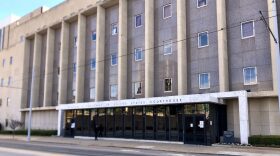Despite one school district’s call for minimum safety standards in the wake of a fatal shooting at a high school football game, the governing body for Oklahoma school athletics took no action to change current security regulations.
The board of directors for the Oklahoma Secondary School Activities Association discussed, but made no decisions, about the possibility of establishing stricter minimum requirements.
The OSSAA board met Wednesday, two and a half weeks after 16-year-old Cordae Carter was fatally shot in Choctaw during an Aug. 25 football game against Del City. Two other people suffered gunshot wounds, and more were injured while fleeing the stadium.
The superintendent of Midwest City-Del City Public Schools, Rick Cobb, urged OSSAA to consider setting baseline expectations for event security.
About 20 other school districts, from both urban and rural areas, told OSSAA they oppose the idea, executive director David Jackson said.
“They felt like we have minimum standards by just requiring that a district address crowd control and other things,” Jackson said. “They were not in favor of OSSAA giving specific guidelines on how to manage security.”
Not every school district needs to match the strict regulations enforced at Midwest City and Del City events, Cobb wrote in a letter to the OSSAA board after the death of Carter, who was a Midwest City High School student.
But he said OSSAA could try to require certain minimum precautions across the state.
“They’re right in saying that we already have some minimums in place, but I think it’s worth having a conversation about whether the minimums should be adjusted,” Cobb said after Wednesday’s board meeting. “As a superintendent, I’m looking to know that my kids are secure whether we’re at home or on the road.”
OSSAA policies require schools to have administrators present at every event and to “provide adequate security.” School districts determine what specific safety measures to have in place.
OSSAA doesn’t have direct control over event security until playoff games.
A recent rivalry football game drew 1,200 people to Hartshorne High School in southeast Oklahoma. Games at urban and suburban schools draw far larger crowds, said Hartshorne Superintendent Jason Lindley, who sits on the OSSAA board.
“I think the needs of a city school are different from a rural school obviously,” Lindley said during the meeting. “I think the differences need to be recognized, so I think local control is a good way to start.”
Few on the OSSAA board objected to the existing standards during their meeting Wednesday, and none called for a vote to change any policies. However, some board members expressed support for creating a committee to look into security protocols.
Several districts contacted the OSSAA to report the procedures they have in place. Jackson said his staff is compiling the information to share with member schools.
Board member Cecilia Robinson-Woods, superintendent of Millwood Public Schools in Oklahoma City, said she favored Cobb’s suggestion of minimum safety procedures for the sake of consistency.
Security measures can vary widely by district, Robinson-Woods said. When Millwood travels to away games, some schools have two police officers present. Sometimes there are 10, she said.
And in many instances, especially at basketball games, most of the officers are placed on Millwood’s side of the court, Robinson-Woods said. Millwood’s student population is 80% Black.
“I am just worried that if we don’t have a minimum then some communities will get over-policed,” she said during the meeting.
Before the shooting, Midwest City-Del City had tightened its security measures with new requirements that spectators pass through metal detectors and carry only clear bags. The district already prohibited stadium reentry and crossing between the home and visitor stands, among other regulations.
Cobb said his schools continue to tweak their procedures.
Choctaw-Nicoma Park Public Schools in the past week announced new football game protocols, many similar to Midwest City-Del City’s rules, including entry through security detection systems.
“Unfortunately, we have seen tragic events unfold in walks of life: at schools, churches, grocery stores, malls, clubs, and now sporting events,” said David Reid, the district’s superintendent. “I don’t pretend to know all of the answers for the mental illness challenges in our world, but we are working on protocols that we think will help.”
This story was originally published by Oklahoma Voice, part of States Newsroom, a nonprofit news network supported by grants and a coalition of donors as a 501c(3) public charity. Oklahoma Voice maintains editorial independence.






